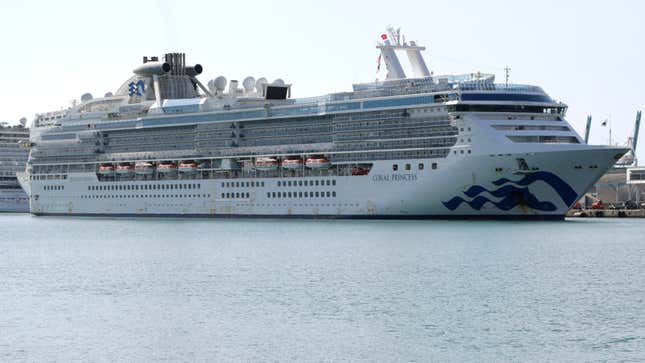
Cruises were a dubious proposition before coronavirus, but now they’re in far worse shape. That’s understandable, given the worldwide pandemic that has had some passengers trapped on ships for weeks. Almost everywhere cruise lines look these days, the news isn’t good.
About a third of cruise passengers are over the age of 59, according to The New York Times, which not the stat you want in the coronavirus era. Cruise lines also weren’t included in the $2 trillion federal stimulus bill, despite President Donald Trump’s urging, which is a bad thing for cruise lines that might need access to liquidity. Cruise lines are also mostly not currently running any cruises, which doesn’t bring in any revenue.
And, now, banks and investors are smelling blood in the water, as cruise companies grow increasingly desperate for cash:
And last week, Carnival, which has already drawn on bank credit lines, began an effort to raise $6 billion by selling stock, bonds and other securities. It was selling some of those bonds with a suggested 12.5 percent interest payment to investors, a strikingly high figure.
Twelve and a half percent! Surely it can’t get worse.
Before the equity offering, Goldman Sachs, JPMorgan Chase and Bank of America had been working to put together a debt deal for Carnival that would offer some investors a potential return in the high teens, according to two people familiar with the discussions. Bankers pitched the deal to hedge funds and private equity investors, some of whom passed on it because of concerns about the company’s long-term viability.
You don’t have to be a financial genius to recognize that the high teens are bad, or that Goldman, Chase, and Bank of America had come to that number after determining that the stakes for Carnival are existential.
Carnival’s stock price did somewhat recover this week after a nosedive began in February, but that was only after Saudi Arabia’s state fund injected in some cash after revealing it owned 8.2 percent of the company. Saudi Arabia has deep enough pockets to weather this particular storm probably no matter what happens, but Carnival, which operates about half the cruise business in the world, might not.
Carnival Cruise Line said last week that it is further canceling some of its sailings through the end of the year, making it the first major cruise line to do so because of the global health crisis.
The company said last week that it expects most of its ships to be idled for a prolonged period. If 80% of its fleet were to be put in a prolonged layup, the company could reduce its monthly cash burn by about $100 million to $150 million, allowing it to survive as long as 15 months without revenue, UBS Securities LLC analyst Robin Farley said in a note to clients.
Fifteen months from now would be sometime around July 2021, so if you think the world will be back to normal before then, well, Carnival has some stock and probably wouldn’t mind if you bought in.